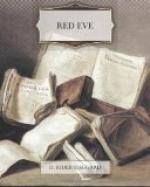“Yes, I’ve the terror,” said Nicholas with something like a groan. “Every sin I ever did—and most of them have been for you, lord—seems to haunt my sleep. Yes, and to walk with me when I wake, preaching woe at me with fiery tongues that repentance or absolution cannot quench or still.”
“Yet, Nicholas, I think that you must add one more to their count, or a share of it, which should weigh light among so many. Either I or de Cressi must pack for our last journey, and if we meet face to face to-morrow, how know I that it will be de Cressi? Better far that we should not meet.”
“Lord, lord, you cannot fly! He is King Edward’s champion, so proclaimed before all whose names are written in the Golden Book of Venice. He would cry your shame in every Court, and so would they. There’s not a knight in Europe but would spit upon you as a dastard, or a common wench but would turn you her back! You cannot fly!”
“Nay, fool, but he can die—and before to-morrow. What makes your brain so dull, Nicholas? It is not its wont.”
“Ah, I see—not flight, murder. I had forgotten; it is not a usual sauce to a banquet of honour even in Italy, and therefore, perhaps, the safer to serve. But how is it to be done? Poison? He is in Carleon’s house; Carleon has faithful servants. Though perhaps a basket of rare fruits—but then he might not eat them; those Englishmen live mostly on half-raw meat. The signora would probably eat them, and the others.”
“Nay, no more of your drugs; your skill in them is too well known. Come, these men have been watched since they set foot in Venice. Have they offended none besides myself and the Swiss?”
A look of intelligence crept into the eyes of Nicholas.
“Now that you mention it, lord, they have. There is a certain boatman and bravo called Giuseppe. With him and his mates they quarrelled about their fare and threw them into the canal in front of the ambassador’s house, just because they drew a knife or two. A woman I know told me of it. He’s a great villain, this Giuseppe, who would do anything for ten pieces, also revengeful and a hater of cold water.”
“Send for him, Nicholas, or send this woman to him—that may be safer. Ten pieces! I’ll pay him fifty.”
“Ay, lord, but the Englishman may not give him a chance. Only fools would go out walking in Venice along after dark if they should happen to have enemies here, and the house is watched by the Doge’s Guards. Yet one can try. Fortune loves the brave, and Englishmen are very great fools. They might stroll abroad to see the moon rise over the Adriatic.”
“Try, Nicholas, try as you never tried before. Succeed, too, lest you and I should part company and you never be named abbot after all.”
The afternoon of the day of their reception by the Doge was well filled for Hugh and Dick. Scarcely had they eaten with their host when the Marshal and his officers arrived with the articles of the Morrow’s combat very fully drawn up, each of which must be considered with the help of Sir Geoffrey Carleon, lest they should hide some trick, before they confirmed them with their signatures. Not that Hugh was over-anxious about the details. As he said to Sir Geoffrey, all he sought was to come face to face with his enemy, even if he had but a club for a weapon.




